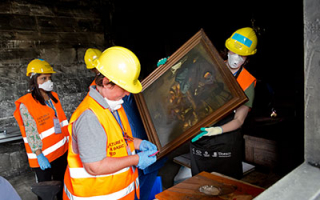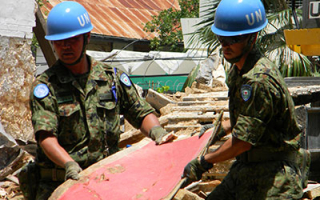A fire, a flood, a storm surge. A hail of bullets, or an exploding projectile. Collateral and deliberate damage. All these pose an immediate threat to people and heritage, whether monumental building, tangible cultural object or intangible cultural custom. In an emergency, both life and way of life require fast-responding expertise.
Enter the Eighth International Course on First Aid to Cultural Heritage in Times of Crisis (FAC), organised by The International Centre for the Study of the Preservation and Restoration of Cultural Property (ICCROM) and its partners the Swedish Postcode Foundation (SPF), the Smithsonian Cultural Rescue Initiative (SCRI), and the Prince Claus Fund for Culture and Development.
From Monday 11 November to Friday 06 December 2019, international experts will travel to Italy to train FAC course participants in a four-week workshop. The goal: to develop capacity and resilience in communities for the protection of cultural heritage against disasters, by training professionals from around the world in what to do before, during, and after a crisis. The long-term aim is disaster prevention and response through risk reduction and management, as well as climate change adaptation and conflict transformation. FAC 2019 comprises the flagship component of both ICCROM's 'First Aid and Resilience for Cultural Heritage in Times of Crisis' (FAR) programme, and the SPF's 'Heritage for Peace and Resilience' agenda. Out of this comes the 'Culture Cannot Wait' initiative: urgency is the key here.
The FAC workshop will take place mostly in Rome, host location of ICCROM's headquarters. From Wednesday 13 to Thursday 21 November, activities will move to Norcia in Perugia, location of a 6.6 magnitude earthquake in 2016 and victim of severe damage to heritage treasures, such as its churches. The town will be the setting for scenario-based training in risk assessment, heritage and humanitarian first aid, emergency structural stabilisation, and heritage salvage, among other themes. After Norcia, the course will climax with a simulated emergency on Wednesday 27 November. Everything the participants have learned thus far will be put to the test in a high-pressure environment alongside their peers. Afterwards, all will be given the opportunity to debrief and reflect on their experiences.
The FAC workshop in Rome and Norcia is nevertheless only the second interactive phase of what is in fact a nine-month-long course. The first phase of FAC 2019 ran earlier this year, and debuted a pre-course mentoring process, giving all participants a chance to familiarise themselves with key concepts from the world of both cultural heritage preservation, disaster risk management, and humanitarian aid. It has also allowed them to prepare for the final phase, in which FAC trainees will be urged to pass on their knowledge by organising follow-up trainings of their own: to date, over 40 such spin-off trainings have been organised. FAC 2019 will also be the first time after which alumni may apply directly to ICCROM for seed grants. This affords organisers a real opportunity to conduct research on project outcomes, and to see if ‘lessons learned’ can go mainstream outside the specific domain of cultural heritage, at both national and regional levels.
This year, 16 participants have been chosen from an original pool of 193 applicants. A near-even split of men and women, they work for a variety of national governments, NGOs, and academic institutions. Most are specialists within the fields of cultural heritage and conservation, with others representing civil protection, disaster risk management, humanitarian aid, and urban development. The participants come from all over the world, representing five continents and 14 countries, 13 of which are ICCROM Member States: Chile, Egypt, Estonia, Georgia, Honduras, India, Iraq, Italy, Japan, Spain, Syria, Trinidad and Tobago, and the United States of America. With the addition of South Sudan, six participating countries are classified as risk-prone, according to the IASC INFORM Global Risk Index 2020. Previous trainings have involved over 160 participants from 84 countries.
FAC training has created an expanding international cadre of rigorously trained professionals. With skills that traverse traditional disciplinary boundaries, they are equipped to respond when a disaster threatens to destroy irreplaceable culture. Their work will ensure that communities that face crisis are prepared to protect their heritage. When disaster strikes, Culture Cannot Wait.



